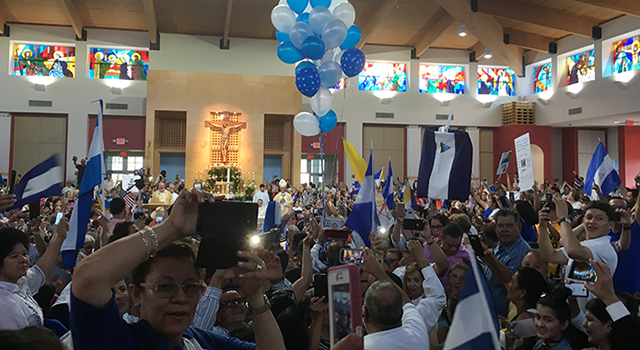By Rocio Granados - La Voz Catolica
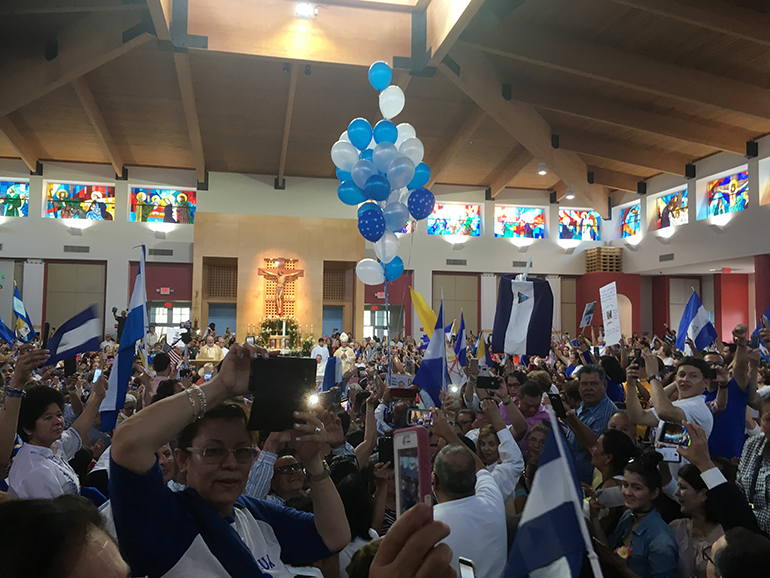
Photographer: ROCIO GRANADOS | LVC
Hundreds of Nicaraguans living in South Florida came waving blue-and-white flags, banners, posters and even balloons to St. Agatha Church in Sweetwater April 28, to bid farewell to Bishop Silvio Báez, auxiliary bishop of Managua. He celebrated Mass there after a week-long stay in Miami with family before flying to Rome, where his presence was requested by Pope Francis.
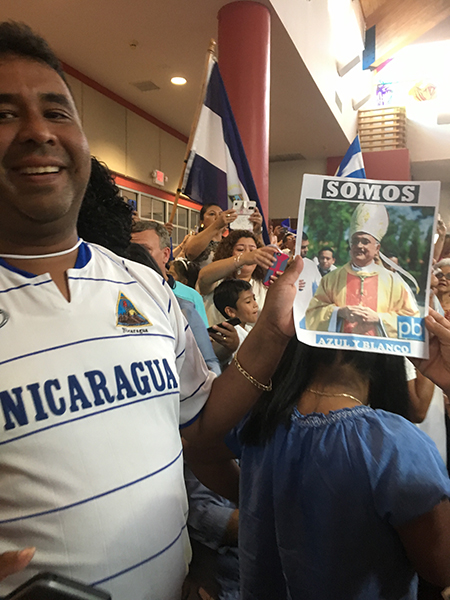
Photographer: ROCIO GRANADOS | LVC
Wilson Lacayo, a Nicaragua native who has lived in Miami for the last 35 years, said he went to St. Agatha to celebrate Mass with Managua's Auxiliary Bishop Silvio Báez because he "has supported us in every struggle and he always asks God for all of us, that Nicaragua will be free."
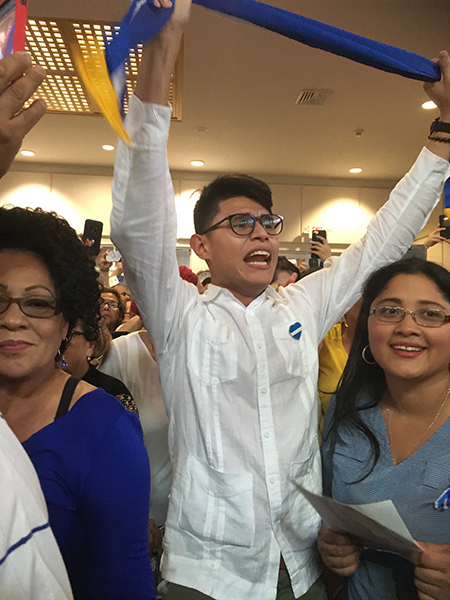
Photographer: ROCIO GRANADOS | LVC
Taking part in the Mass at St. Agatha with Managua Auxiliary Bishop Silvio Báez: Lesther Alemán, one of the student leaders who asked Nicaragua President Daniel Ortega to stop the repression after his government's violent put-down of student protests that began in April 2018.
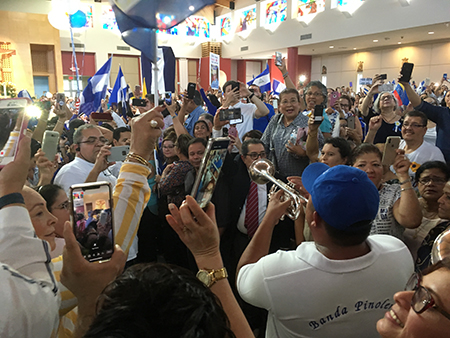
Photographer: ROCIO GRANADOS | LVC
Accompanied by a Nicaraguan band, the faithful sing Happy Birthday to Managua Auxiliary Bishop Silvio Báez at the conclusion of the Mass at St. Agatha, April 28.
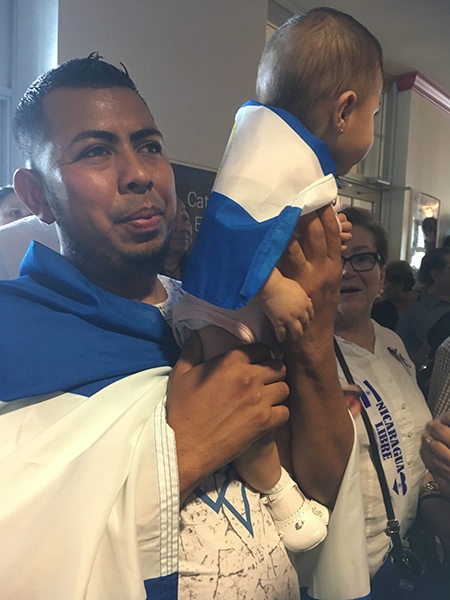
Photographer: ROCIO GRANADOS | LVC
Jairo López and his daughter, Abigail, take part in the farewell Mass for Managua Auxiliary Bishop Silvio Báez. The Mass was celebrated at St. Agatha Church in Sweetwater April 28.
SWEETWATER | Rosemary Torres Juárez was a student at the National Autonomous University of Nicaragua when she and a group of friends decided to take supplies to fellow students who had barricaded themselves in Managua’s cathedral. They were protesting the government of President Daniel Ortega. It was April 20, 2018.
The protest had begun two days earlier, after the government announced changes to the social security system, including an increase in the amount of money to be deducted from workers’ paychecks and a decrease in the monthly pensions of retirees.
When Torres arrived at the Universidad Nacional de Ingeniería (National University of Engineering), located near Managua’s cathedral, anti-riot troops were attacking the students. Torres figured if she stayed, she would die. She chose to run and take refuge along with the other students in the cathedral.
When the anti-riot troops burst into the church, she called her family to say goodbye. “The first one I called was an uncle: Tío, I’m saying goodbye because I don’t think I’ll hear your voice again,” she recalled amid sobs.
At the Metrocentro bridge nearby, shots were being fired.
“For doing what? What did we have in our backpacks? Only rocks to defend ourselves. And who were we going to kill with those rocks from so far away? And then we ran when we saw the tear gas grenades,” Torres said. “It’s the only thing we were doing, and we were persecuted for that.”
Torres was in the process of obtaining legal residency in the U.S. After that, her mother called a lawyer to speed up her case, and three days later she arrived in the U.S.
“It hurts that aside from persecuting my country, they persecuted my parents, persecuted Nicaragua’s shepherds who have been with us from the start, who have stood up for us,” said Torres, referring to Bishop Silvio Báez, Managua’s auxiliary bishop.
When he visited Miami the first week of Easter, and celebrated Mass April 28 at St. Agatha Church, she returned the favor.
“I’m here because of that, because I’m alive thanks to God and to the shepherds of our Church, who opened the doors so that so many of us young people could take refuge,” she said.
Hundreds of Nicaraguans, carrying their blue-and-white flags, banners, posters and even balloons, attended the Mass to support Bishop Báez, who bid farewell to Miami’s Nicaraguan community before departing a day later for Rome.
Since the start of the anti-Ortega protests in April 2018, led by young people but extending to every strata of civil society, the Catholic Church has protected and taken in demonstrators as they fled armed attacks by pro-government mobs.
The Catholic Church and Bishop Báez “have protected them and sheltered them. They have cried with them, have experienced death with them, and have witnessed the unjust crucifixion of an unarmed populace,” said Father Marcos Somarriba, pastor of St. Agatha and a native of Nicaragua.
That’s why, when the local Nicaraguan community found out the bishop would be celebrating Mass at the parish, they showed up en masse. Around 3,000 people tried to cram into the church, which has capacity for around 1,200.
During his homily, Bishop Báez said Nicaraguans are “a people wounded by injustice, ambition, corruption and criminal repression. But those wounds will resurrect. May the mother of Jesus intercede for us, so that we may endure the wounds suffered while fighting for a more humane and just society, and not allow ourselves to be robbed of joy and hope.”
After the Mass, the crowd celebrated the bishop’s birthday with a cake that resembled the Nicaraguan flag, as well as a band of Nicaraguan musicians and another of mariachis. The afternoon ended with Nicaraguan singer Carlos Mejía Godoy leading the crowd in a rendition of “Nicaragua Nicaragüita” marked by cheers and applause.
Bishop Báez thanked Miami Archbishop Thomas Wenski for having welcomed him to Miami’s Church, as well as the priests and deacons who took part in the Mass. He told the Nicaraguans who remain in their homeland, “I take you in my heart. I continue to pray and weep for you, and I will never forget you.”
To those living away from their country, he said, “Now I, too, like yourselves, am experiencing in my own flesh how difficult it is to live away from the homeland. Do not lose hope, and pray a lot, because our homeland needs a miracle.”
Regarding his departure, he added, “I am very sad to leave Nicaragua, but I leave proud of being Nicaraguan and of belonging to this noble people. I take a suitcase full of faces, of stories, of tears and of hearts.”
Bishop Báez is viewed as the most prominent critic of the government of President Ortega and his wife and vice-president, Rosario Murillo. The bishop’s temporary exit from Nicaragua, requested by Pope Francis due to threats on his life, has caused pain and indignation among Nicaragua’s people.
“We come to say goodbye to a bishop who is being expelled from Nicaragua. And that is very wrong, I don’t like it. He is a person who is loved by everyone in Nicaragua,” said Ivonne Vaca, a Nicaraguan living in Miami who attended the Mass.
“Nicaragua feels the vacuum of his presence, of his voice,” said Father Somarriba, citing conversations he has had with priests in the country. “But they hold onto the hope that, through the means of communication which he has always utilized very well, he can continue to raise his voice in defense of the most defenseless.”
FOR THE RECORD
- According to the Interamerican Commission on Human Rights, the Nicaraguan government’s violent response to the protests that began a year ago has led to the deaths of 325 people along with more than 2,000 wounded
- According to statistics gathered by civic organizations, nearly 800 people were detained, at least 500 of whom remain in jail. 300 health professionals were dismissed from their jobs, 144 students in the National Autonomous University of Nicaragua were expelled, and more than 70 journalists and others working in the media were forced into exile.
- Nearly 62,000 Nicaraguans have sought refuge in neighboring nations such as Costa Rica, according to the Office of the United Nations High Commissioner for Refugees.
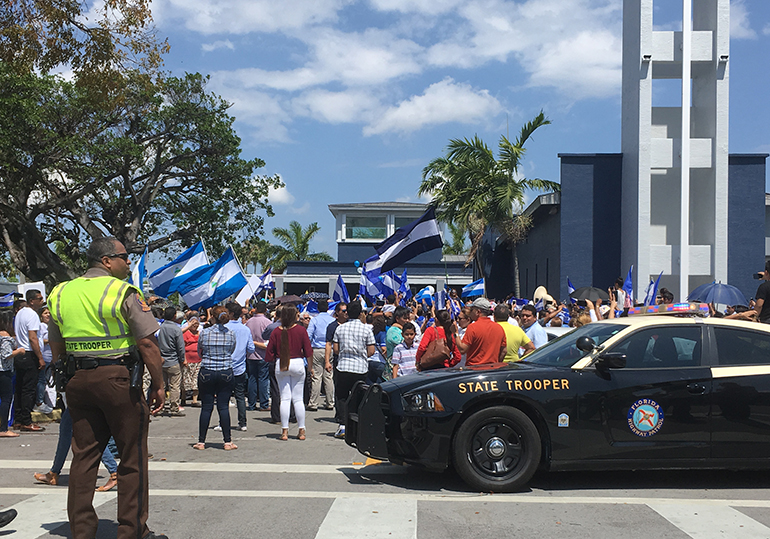
Photographer: ROCIO GRANADOS | LVC
Hundreds of Nicaraguans living in South Florida came waving blue-and-white flags, banners, posters and even balloons to St. Agatha Church in Sweetwater April 28, to bid farewell to Bishop Silvio Báez, auxiliary bishop of Managua. He celebrated Mass there after a week-long stay in Miami with family before flying to Rome, where his presence was requested by Pope Francis.
Corrected: The initial story incorrectly translated the Universidad Nacional de Ingeniería as the School of Engineering of the National Autonomous University of Nicaragua. In fact, UNI is a separate university located next to Managua's cathedral.
